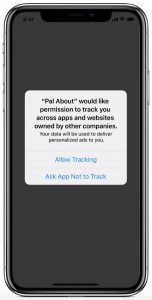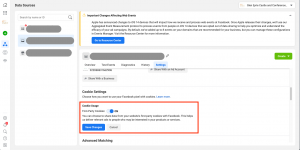Just when we started to get used to things, Apple is releasing a new operating system- iOS14- which includes the release of AppTrackingTransparency (ATT). There’s a lot going on with this update, so we’ve done our best to summarize why this new update matters to marketers, the implications of the update on Facebook and Instagram advertising, and what you can do to be prepared.
What Is It & Why Should I Care?
Apple’s newest operating system iOS14 includes the “AppTrackingTransparency” (ATT) framework. This new feature promotes better data privacy and moves away from the old “opt-out” framework into a new “opt-in” method. Essentially, Apple users will now choose to opt in to have their behavior tracking instead of inherently being tracked and later having the choice to opt-out.
This new ATT framework is a huge deal to app owners who rely on personalized advertising or behavior tracking, like Facebook and Instagram. The update applies to all mobile apps but does not affect desktop users. Although iOS14 has already launched, Apple is giving developers time to react to the changes and an official rollout is expected sometime in Spring 2021.
Here’s what it might look like:
When on an iOS14 (or higher) enabled mobile device, the user will be prompted to opt in to tracking. This will appear when a user logs into the app for the first time since the upgrade and when installing any new apps on their iOS14 enabled device.
Users only need to opt-in once and the prompts will look something like this (according to Apple):

So, what does this mean for marketers and advertisers?
A lot. Long story short, the number of data marketers have access to is going to decrease significantly.
When a user opts out of tracking on their Apple device, Facebook isn’t able to collect their data to serve personalized ads. The mathematical algorithms Facebook uses create patterns of behavior that can then be used to predict future data. For so long, marketers have been reliant on machine learning data to personalize ad experience – this method of marketing has really exploded in the past few years, but is about to change exponentially.
This is the “magic” behind Facebook serving ads for similar shoes to the ones you just viewed on Amazon. When we lose data signals, the algorithms are less accurate over time and in-app personalization decreases. So, if you opt-out of tracking, you won’t get to see that really cool Buzzfeed article about which Stranger Things character you are – Facebook won’t know.
Potential Scenarios for How this Will Play Out
Because Apple hasn’t formally rolled out these new policies, we have a general idea of what to expect but we really don’t know.
The Doom & Gloom Scenario
Worst case scenario, every iOS user opts out of tracking. Even if this is the case, not all is lost. Marketers could still serve ads, just not as targeted as before to iOS users. And, because the new update only applies to mobile apps, marketers could still serve personalized ads to iOS users on web browsers.
Regardless, in this scenario, user experience is diminished because iOS users are not getting targeted content and personalized ads. We can expect Facebook and Instagram will lose users because of this.
The Realistic Scenario
Assuming 33% of iOS users opt-in to tracking…
- Marketers lose 66% of tracking data for iOS users (and also the ability to retarget those users).
- Revenue decreases because Facebook doesn’t have sufficient data to serve ads in the most optimized way.
- Marketers aren’t able to make informed budgeting, targeting, and optimization decisions due to limited data.
We can also assume since Facebook won’t be able to track in-app activities like Pages, People, and Groups you are personally interacting with, we’ll see changes to the Newsfeed. Both organic and paid content will take a hit since the personalization data is diminished.
Of course, all of these changes aren’t going to happen overnight. Instead, because Facebook learns more about you the more you use the product, as less and less data is collected your experience will decrease over time. We won’t truly know the impact of these changes for at least a few months, even a year, after the launch.
Isn’t data privacy a good thing?
You might be thinking, “well I don’t really want Facebook to know that much about me anyway.”
That might be partially true, but in reality, personalized advertising actually enhances the advertising experience. The more personalized your ads, the less likely you are to get discouraged or hide ads because they actually matter to you.
Recent data on the new privacy protection protocols from Apple show mixed reviews. The majority of survey respondents (65%) said they would prefer not to be tracked between sites and apps for relevant ads and would be content with generic ads not based on their interests.
On the other hand, 59% agreed they would allow tracking if that’s how the app delivers relevant content. But that’s the thing – in order to receive relevant content, users have to opt in to tracking.
Apple might seem like the white knight in this scenario, fighting the good fight to protect the data of its customers. It’s all a facade, though – Apple is looking out for themselves. Facebook, Google, and other similar personalized app platforms rely on user data to cater to the user experience. If users choose to opt-out of tracking, the app becomes less personalized and relevant, and users stop engaging.
With fewer users, marketers are forced to find users in other platforms – most notably Apple’s own ad network. At the end of the day, Facebook makes less and Apple makes more. Plus, Apple’s personalized ad network isn’t subject to the new iOS policies, meaning they can use your data however they want.
On a smaller scale, millions of small businesses rely on Facebook as their number one source of purchases and new traffic. For small businesses that have built their entire marketing funnel around Facebook advertising, losing half of the daily users could cause significant impacts. In fact, Facebook suggests most small businesses will see a cut of 60% in website sales because of these new policies.
Recommended Actions to Prepare for ATT Updates
So, what can we do?
There are a few things Facebook advertisers can prepare for the new Apple updates. A good first step is to check your Google Analytics traffic to see how many of your users are coming from Apple devices. This will give you a good baseline for how many of your users will be impacted by the changes.
Changes in Facebook Ads Manager
- Confirm you have one pixel per catalog (if you’re using dynamic ads)
- Update your attribution windows to 7 day click, 1 day view. As part of the policy changes, 28 day click-through and view as well as 7-day view will be eliminated.
- Verify your domain. Domains can only be verified by one business manager and can be verified using a meta tag, DNS record update, or HTML file upload.
- Prioritize your Facebook Events (Aggregated Event Measurement). Facebook will only allow 8 conversion events per domain, in an effort to standardize data for all advertisers. If you don’t prioritize your events, Facebook will decide which event to report. For example, if “add to cart” and “purchase” events are completed by one user, only the higher prioritized event will be reported.
Anticipate Reporting Losses and Traffic Changes
- If you haven’t already, switch to Google Analytics 4. Google Analytics 4 uses machine learning to develop actionable insights for the upcoming cookie-less world that many digital marketers are predicting will be coming soon. Also, consider using Multi-Channel Funnels
- Expand your traffic sources. A good marketer knows you shouldn’t rely on one traffic source for revenue anyway, but now is the time to get serious. Now is the time to get aggressive on other paid platforms outside of Facebook/Instagram, focus on organic SEO (earned traffic), and owned traffic like email marketing and SMS marketing.
- Change your Facebook pixel setting from 3rd party cookies to first-party cookies.

Good marketers are flexible, so this new update from Apple and the implications on Facebook advertising is just part of the job. Don’t wait until the last minute. Keep your eye on updates from Facebook as we get closer to the official launch of ATT and let us know if there’s anything we can do to help. Our team is full of Facebook update sleuths and problem solvers!
